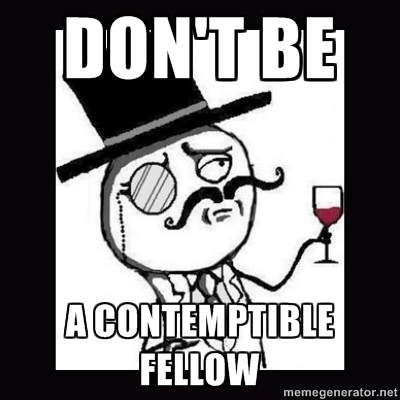When Did a Dick Become a Bad Thing?
April 3, 2020
Categories: Sex
I was having dinner with a friend awhile back who said, “He’s such a dick.”
The comment was made in reference to a guy who was a complete jerk.
As the conversation went along, I started thinking about the ways in which we use language referring to sex or our bodies to describe something bad.
“That was fucked up.”
“I can’t stand that asshole.”
“What a prick!”
“Don’t be such a pussy.”
Discomfort With Bodies and Sex
Our use of language reflects our reality. In this case, I think our language reflects an underlying negativity and discomfort with our bodies and our sexuality.
How did your parents teach you about sex and your body when you were growing up? Did they say “penis” and “vagina?” Or did they use slang terms? If they used slang terms, how do you think those terms reflected their attitudes or (dis)comfort with sex?
For example, one man said his dad would scold him and say, “Stop playing with your ding-a-ling!” There was a woman whose parents wouldn’t even call her sexual body parts by a name. They were just referred to as “down there.” It’s easy to brush it off and not think about it, but everything has meaning.
Language Reflects and Creates Our Reality
Language doesn’t just reflect reality, but it also creates reality. Every time we speak, we are, in a sense, creating the world we live in. There is great power and responsibility in that.
So, the next time someone does something that reflects a great deal of strength or courage, I’m going to yell out, “Yes! You’re such a dick!”
I’m not certain it will catch on. But who knows?
Discussion
What words do you use to describe sex or your body? How does your language reflect your underlying attitudes? What do you think about the power of language to change the world we live in?

Related Thoughts
No Comments
Leave A Comment

Subscribe To My Newsletter
Join my mailing list to receive the latest blog posts.
Receive my e-book “The Mental Health Toolkit” for free when you subscribe.



Looking forward to the comment string for this post! ha! This reminds me of a conversation from a weekend last year with you, CR, and me.
One of the expressions that a co-worker often uses is “he’s just dickin’ around.” I’m going to challenge him to say “he’s just gall bladdering around” instead.
My parent’s guideance around sexual body parts was pretty much non-exsistant. I don’t ever remember them refering to a body part with the medical or slag term. And honestly, I’m carrying on that tradition with my kids…don’t know how to break that habbit…unless you think I should start shouting “hey, dick head, get to the table, your dinner’s getting cold!”
I agree there is something to this – the temptation with our kids is to use the slang words to discuss the private parts instead of just saying the name. It just feels “weird” sometimes to say the words out loud, especially to a child. There are a lot of stories that go into making it feel “weird” (both personal stories and cultural stories that we tell ourselves). But, we’ve tried to work through that and I think it’s gotten less awkward over time (except for when our eldest says “penis” real loud in public). I’m hoping it will foster more open dialogue about sex as they grow older.
amber and I read this together and loved it. It took courage…you’re such a dick.
There’s just so much satisfaction in saying “he’s such a dick” ! Oh wait….. am I missing the point here? Lol
Love the discussion. I think it’s interesting to consider ‘why’ it feels weird to discuss sex in a straightforward way. I think it’s a private thing, which is probably part of it. But also it’s an area that carries a ton of hurt, shame, struggle, etc. It’s easier to avoid talking about it… but that’s probably not best.
I always insist on using “relatively” standard terms with our little dude. Honestly, it seemed so disrespectful (and confusing) to call a penis a pee-pee or a wee-wee, or whatever, when that is simply what comes out. I also hope that using correct terms will help him avoid equally difficult pitfalls: not to be ashamed of his genitals or overly obsessed with them due to the mystery surrounding “that which shall not be named.” It’s (just) a penis, about half the population has one, and it’s natural for him/you (generally speaking, not meaning you specifically, Dr. Hook….) to be curious about it, to see what it is up to, etc., just so long as it isn’t given excessive attention, especially in public. Shaming kids into “don’t touch/think about it” scenarios can only lead to serious hang-ups down the road.
On the flip side, however, until/unless he has a sister, I see no need in providing the 5-yr-old details about female genitalia. We simply refer to them as “lady parts” – guess we’ll cross the vagina bridge when we come to it…
[…] sadness—your parents taught you that boys don’t cry. Or maybe you received the message that your sexuality was something bad or dirty—you got caught masturbating and felt shame about that, or you had sexual feelings toward the same […]
Jeeeeez man.
I support you in this quest.
Joshua: I used to use an essay by Robert Baker in my Intro to Ethics classes (many years ago) – and it was titled “Pricks & Chicks: A Plea for Persons.” Are you familiar with it? I had an entire lesson on “bad words” – their origin, history, and meaning. I would ask the students “Why don’t we call someone an elbow or a knee-cap or a spleen? Unless we already assume there is some kind of (Manichean) evil association with some body parts and not others?” (Sometimes the term “numb-skull” is used, for example, but this is more in terms of a person’s intellectual short-comings rather than a moral judgment, I think.)
I am not familiar with it, but it sounds interesting! Thanks for sharing.